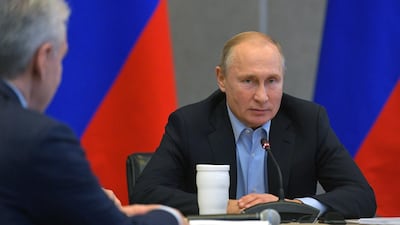It’s a hard life being Vladimir Putin, when all you want is a little respect. In power in various ways since 2000, the president of Russia's global influence had steadily grown − until recently.
Mr Putin, a former KGB colonel, believes that division and disarray among Russia's neighbours furthers his international ambitions. In 2014, Russia was able to annex Crimea and undermine the Ukraine government. In 2016, Britain's vote to leave the European Union and the rise of populist, anti-EU parties elsewhere boosted Mr Putin's aims. Soon after, the election of Donald Trump as president of the United States gave a huge fillip to the Kremlin − as politics in Washington became increasingly dysfunctional, the reliability of American leadership was questioned worldwide. Meanwhile, the endless war in Syria brought Russia back to the top table of international relations.
But now? In Putin world, things are not so good.
This week, General Mark Carleton-Smith, head of the British army, reminded the UK and European governments that Russia is a “far greater threat” to western security than ISIS or other terrorist groups. Britain, he said, “cannot be complacent” about the Russian threat because “the Russians seek to exploit weakness and vulnerability wherever they detect it”.
The UK and other nations rightly blame Russia for the botched Novichok nerve agent attack against the former Russian spy Sergei Skripal and his daughter, back in March, in the provincial English town of Salisbury. Other incompetent Russian intelligence operations have been uncovered in Europe. Combined with the Mueller inquiry into serious allegations of interference in US politics, this has resulted in the US, UK and other allies expelling 150 Russians, allegedly connected to the country's intelligence services.
The wider national security climate has changed, too. Sweden, the Baltic states, Poland, Ukraine and other neighbours are increasingly alarmed and are adopting new defensive measures against what they see as a clear and present Russian danger.
President Macron of France and Chancellor Merkel of Germany have talked enthusiastically about the creation of a European army. It may not happen, at least in the short term, but the EU is slowly waking up from its complacency about defence spending, largely because Mr Putin has overplayed his hand in staging provocative military exercises on the borders of EU and Nato countries. Donald Trump’s reputation as an unreliable ally is also forcing Europeans to rethink their own security measures.
The mood has soured in Washington, too. Democrats, with control of the House of Representatives beginning in January, will undoubtedly reinvigorate inquiries into Russian meddling in the 2016 election. Donald Trump’s new National Security Adviser John Bolton − a defence hawk − is pushing the US to withdraw from the 1987 Intermediate-Range Nuclear Forces treaty, citing clear Russian breaches of the agreement. America had previously tolerated those breaches, but that game is now over.
There was another setback for Mr Putin at the 87th Interpol summit, held in Dubai. Britain and the United States managed to lobby international police forces and thwart the Russian candidate Alexander Prokopchuk’s ambitions to become the next head of Interpol. Prokopchuk, unsurprisingly, is said to have ties to Russian intelligence.
But something much more fundamental undermines Mr Putin − Russia’s economic failure. Russia has great natural resources, stretching across 11 time zones, with “21 republics, nine territories, 46 regions, one autonomous region, four autonomous districts, and two cities of federal subordination: Moscow and St Petersburg,” according to a state-run website.
Yet this vast nation of 144 million people is an economic dwarf. GDP per head is $10,700 (Dh39,300). Liechtenstein has a GDP of $139,000 (Dh510,500), the USA $60,000 (Dh220,400) and Germany $44,000 (Dh161,600).
True, Mr Putin brought stability after the chaos of the Gorbachev and Yeltsin years. But this was stability to the benefit of crony capitalism and oligarchs who plundered national resources.
Transparency International puts Russia near the bottom of its Corruption Perceptions Index, indicating poor performance. Now ranking 135 of 180 countries surveyed, it has fallen from 90th place at the beginning of Mr Putin’s second presidential term in 2004.
Russian websites have also calculated that the cost of the “average bribe” has risen in that period – across the country, kickbacks for education, health care, the justice system and other parts of daily life are considered normal household expenses. People travelling to Russia, including those who visited for the 2018 World Cup, are also advised to leave their laptops at home and to keep their mobile phones turned off, in order to prevent their financial details being stolen by cybercrooks.
As life expectancy grows, political rows about pensions and retirement ages are affecting leaders around the world, but in Russia these issues have proved a particular challenge to Mr Putin, with thousands taking to the streets in protest. On the other side of the age divide, there has been a viral campaign among teenagers, who have been busily chalking "Putin is a thief" on school blackboards.
It is possible that Mr Putin could, even now, turn things around. He could resolve to be a better neighbour, recognise that Russia is feared but not respected, crack down on the oligarchs and attack corruption. But when I suggested all this to a former British diplomat with a close interest in Russia, he laughed and replied: “The problem is not corruption in the system. The problem is that corruption is the system.”
Gavin Esler is a journalist, author and television presenter


